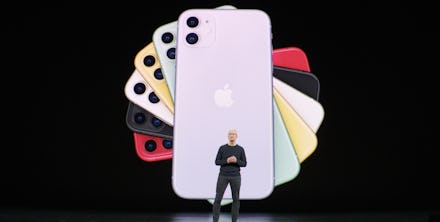The one thing we can agree on about iPhone 11

After much anticipation and speculation, Apple finally revealed the latest crop of iPhones today during its annual presentation on Tuesday in Cupertino, CA — and thankfully, this time there'll be no arguing on how to pronounce the name. The iPhone 11 and iPhone 11 Pro have officially been confirmed, and that means it's time to start thinking about which model is right for you – or if it's worth an upgrade at all. Now that the cat's out of the bag, here's everything we know post-Apple's latest showcase of its upcoming products.
Some of the most notable alterations include some striking new colors, the powerful A13 Bionic chip for faster processing, and the dual-camera setup on the back of the phone rife with several important features for excellent portraits and a similarly fantastic front camera configuration for killer selfies – including slo-mo selfies that'll have you eagerly passing your phone around for all your friends to try.
What new features does the iPhone 11 include?
The iPhone 11 is Apple's latest flagship phone and entry device. But what makes it different from last year's denominations? For one thing, a dual-camera setup. This particular model features a double-camera configuration with a square-shaped cutout on the back of the device. That means the dual camera from the iPhone X has been translated for the iPhone 11 as a new, larger cut-out square on the back of the phone for larger camera cut-outs. They seem a bit more obtrusive than what the phones have featured in the past.
Last year's iPhone XR featured a single 12-megapixel wide-angle camera, but now you can expect a dual-camera system with a 12-megapixel ultra-wide camera that includes 2x optical zoom. There's a revamped camera interface that lets you include everything outside of the frame as well, so your ultra-wide photos will include a wide variety of additional details.
The iPhone 11 will also come in a variety of colors, some for the first time: red, purple, white, green, yellow, and black. It will include a 6.1-inch display with a notch at the front for the phone's Face ID camera.
The phone's also getting Night Mode in a bid to compete with Samsung's Note 10 and S10 phones as well as Google's powerful Pixel cameras. Night mode uses a process called "adaptive bracketing" to improve shots taken in the dark or at night. The camera's not just adept with photos, though. It also receives an important update for the phone's video as well.
While filming, you can switch between both regular and ultra-wide camera options, with 4K support up to 60 fps, time lapse, and slo-mo. There's also extended dynamic range for both cameras, including an upgrade to the front-facing one. It's being transformed into a 12-megapixel TrueDepth wide-angle camera.
Additionally, it will feature the A13 Bionic chip, an improvement over last year's A12 Bionic processor that powered the crop of 2018 iPhones we welcomed last fall. The chip is being hailed by Apple as the "fastest in a smartphone," and is built for machine learning with a faster Neural Engine for pictures and videos and machine learning accelerators to help the CPU deliver over "1 trillion operations per second." In short, it's built to be quick.
During an on-stage demonstration of the upcoming game Pascal's wager, which is hitting the App Store next month, the A13 Bionic processor's lightning-quick performance was shown off in addition to some seriously impressive mobile graphics, though that's the only real way Apple showed off what the chip was capable of.
Additionally, one large change (though not a feature) will include the omission of the "iPhone" text on the back of the phone, but the apple will remain. It's actually centered this time, making for an attractive finish.
However, the phones won't support 5G – not yet, anyway – so you may want to think about shopping around for that feature on a phone elsewhere if that's what you're interested in. It's still a formidable option should you be looking for a new viable smartphone for the next year or so. While it isn't a wild, massive upgrade from what was previously on the market, there's still plenty of new features to attract potential customers, especially on the camera front.
How much will the iPhone 11 cost?
The iPhone 11's not quite on par with smartphone pricing like the recently-released Galaxy Note 10 and Note 10 Plus from Samsung, which tops out at $1,200. It's a lot cheaper, to the tune of $699 to start with, in fact.
Of course, this is all assuming you want to pay for your shiny new iPhones outright, which likely will not be the case if you're on a contracted phone plan. For unlocked models, this is the kind of cash you'll be expected to part with, however, which is not unreasonable at all given the core upgrades and architecture of the new phone model.
When will the iPhone 11 debut?
The iPhone 11 will be up for pre-order starting Friday, September 13 and in-stores on Friday, September 20, but you'll want to be quick on the draw. These models tend to go very quickly, and it's likely they'll be sold out for a while following their initial debut. If it's imperative that you get the newest model (but don't want to shell out for the iPhone 11 Pro or iPhone 11 Pro Max), make sure you secure yours when you're able to hop online with a pre-order.